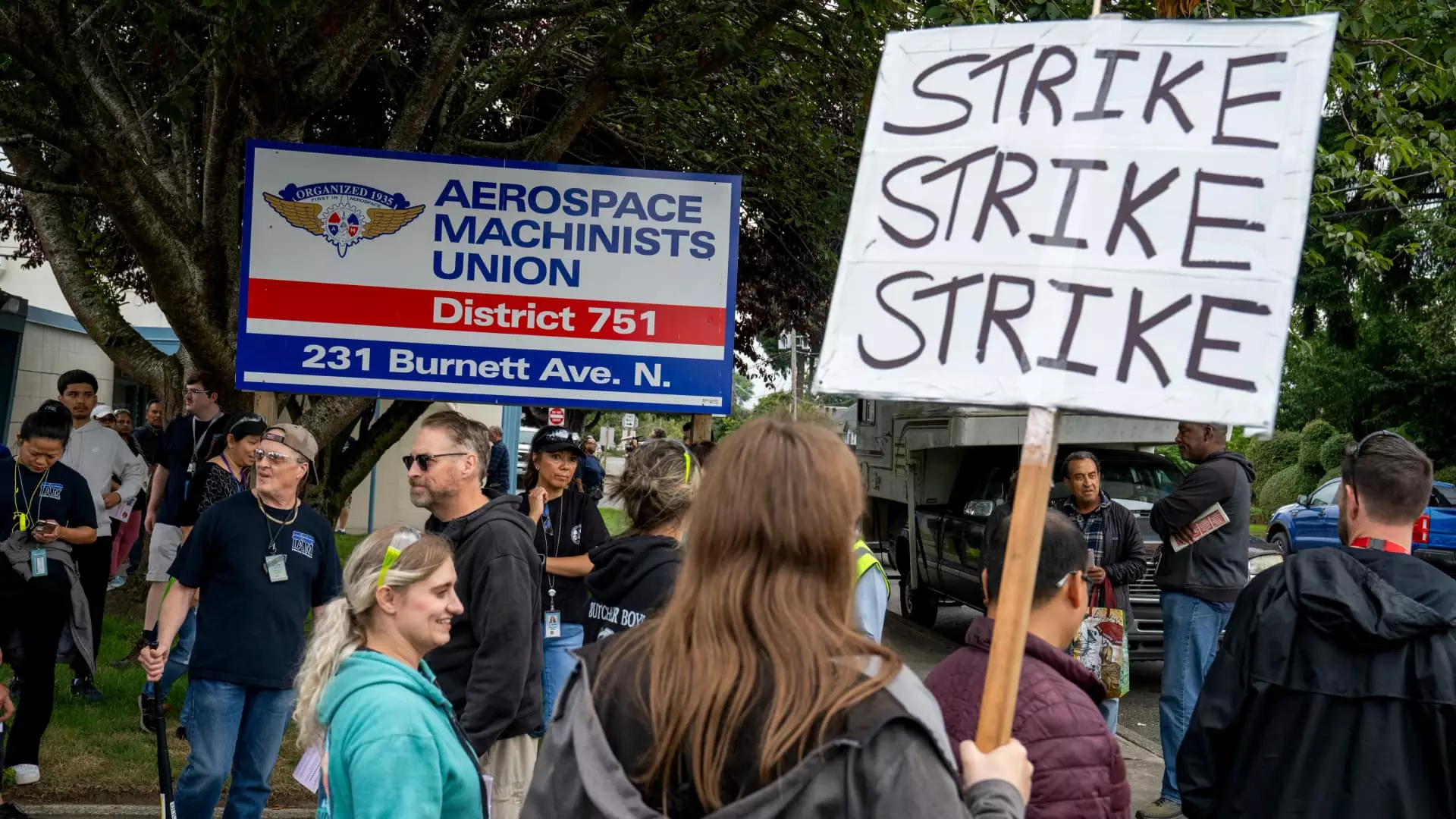In a significant turn of events, over 30,000 Boeing employees are poised to initiate a strike this Friday, a decision that comes on the heels of an overwhelming rejection of a proposed labor contract. This move halts production across the majority of the company’s aircraft lines, presenting a daunting challenge for a manufacturer seeking to restore its reputation amidst a backdrop of safety concerns and production delays.
The situation escalated after workers in Seattle and Oregon cast their votes, revealing a staggering 94.6% opposition to a tentative agreement disclosed just days prior. Notably, the vote to strike surpassed expectations, with an impressive 96% backing the decision, far exceeding the two-thirds requirement needed for a formal work stoppage. As the strike deadline approaches, IAM District 751 President Jon Holden publicly condemned Boeing’s actions, alleging “discriminatory conduct” and “coercive questioning” in the labor negotiations. This deeply rooted discontent underscores the broader struggles facing Boeing as it navigates its recovery trajectory.
The core of the contention lies in the terms of the proposed labor agreement, which included a 25% wage increase alongside improvements in healthcare and retirement benefits. However, the union had ambitiously sought raises closer to 40%, reflecting the intense pressure workers feel from rising living costs. This disparity between expectations and offers not only exemplifies the friction in negotiations but also signals a critical juncture for Boeing’s labor relations, which are tested after years of turbulence.
CEO Kelly Ortberg’s plea ahead of the vote for workers to accept the contract—warning that a strike would jeopardize recovery efforts—has not resonated well within the workforce. With only five weeks in his position, the gravity of this situation presents not just a challenge to Ortberg’s leadership but also raises questions about the company’s direction amidst rising operational costs and competitive industry pressures.
Analyzing the Potential Fallout
The financial repercussions of this labor action could be monumental for Boeing. Jefferies aerospace analyst Sheila Kahyaoglu anticipates that a strike lasting 30 days could incur a striking $1.5 billion loss, alongside destabilizing effects on suppliers and industry supply chains. Should the proposed agreement have been ratified, it was projected to yield an annual financial boon of approximately $900 million. The stark contrast between potential gains and the impending threats of a strike emphasizes the critical interplay between labor relations and overall company health.
This predicament elucidates Boeing’s broader struggle, having burned through roughly $8 billion within the current year alone. Facing substantial debt and setbacks in production targets, the urgency for resolution becomes increasingly crucial. The context of this unfolding struggle adds complexity to Boeing’s future as both internal and external pressures converge.
Comparative Historical Context
Historical perspectives further illuminate this situation, recalling a two-month strike by Boeing workers in 2008. It serves as a reminder of the delicate balance between employee rights and corporate objectives, significantly influencing the company’s operational dynamics. The last fully negotiated contract for Boeing machinists occurred 16 years ago, and while this latest agreement offered promises, it ultimately fell flat in meeting workers’ expectations.
The repercussions of this impending strike, thus, are not merely economic but also symbolic of a larger labor movement that seeks not just better compensation but respect and dignity in the workplace. Such actions resonate deeply within the broader narrative of labor rights and the power dynamics between labor and management.
As Boeing braces for the impending strike, the way forward necessitates a reevaluation of its negotiating tactics. Engaging in genuine dialogue and offering more substantial concessions may be pivotal to mending fences and averting long-term damage. In an era where employee expectations around workplace rights and benefits are evolving, Boeing must navigate its recovery with an acute awareness of the critical role that employee satisfaction plays in its operational success.
Ultimately, this moment in Boeing’s history serves as a crucial inflection point—one that will require adept leadership and strategic changes to foster a renewed spirit of partnership between the company and its employees. With the stakes so high, how Boeing responds will not only shape its immediate operational landscape but also its enduring legacy in the aerospace industry.


Leave a Reply